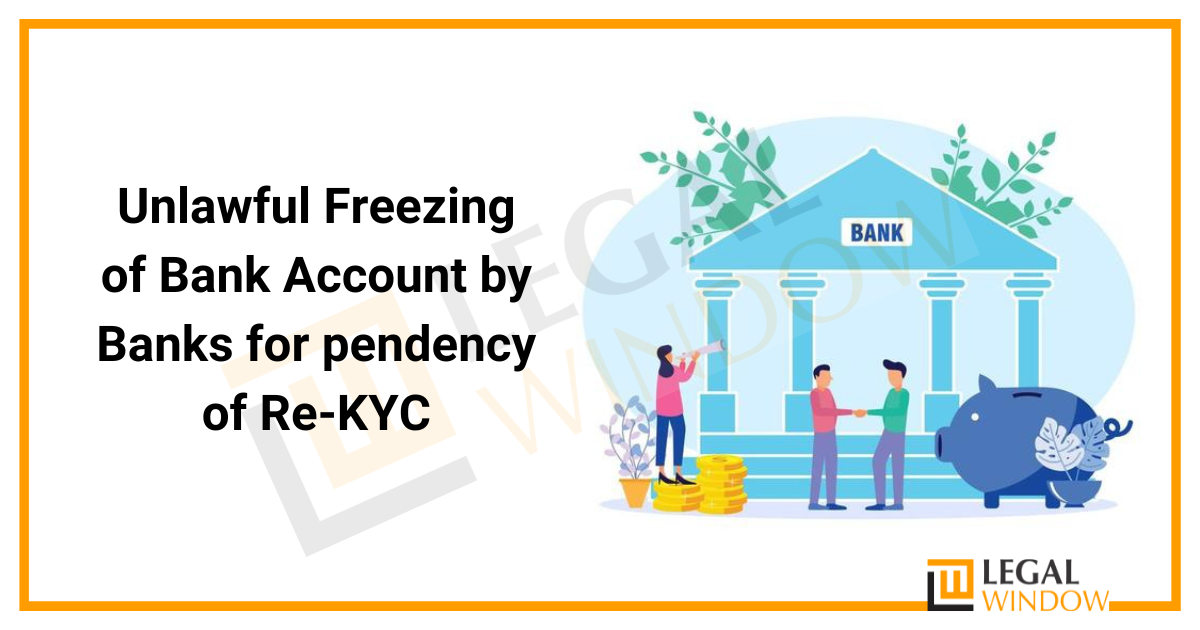Unlawful Freezing of Bank Account by Banks for pendency of Re-KYC
- December 6, 2022
- Miscellaneous

To comply with the Reserve Bank of India’s KYC regulations, banks must update customer identity papers in their records of account holders on a regular basis (RBI). This can be triggered by a significant change in the customer’s profile or the kind of transactions in the account, and it is dependent on the account holder’s risk profile.
In this context, account holders may be asked to conduct re-KYC and submit documentation in addition to the KYC performed at the time of account opening. In this article, we will discuss about Unlawful Freezing of Bank Accounts by Banks for the pendency of Re-KYC.
Let us first gain knowledge about the notion of KYC before we move further to decide the Unlawful Freezing of Bank Accounts by banks for the pendency of Re-KYC is right or wrong.
Meaning of Know Your Customer or KYC
Know Your Customer, or KYC, allows banks and financial organizations to confirm the identification of their clients. As a first-time investor, you only need to complete this once.
Know Your Customer is a procedure in which a financial company verifies the identification of consumers and assesses their suitability, as well as the possibility of illegal objectives and actions. Money laundering is one of the most serious threats to a country’s economy. The government and financial institutions are constantly on the lookout for such unlawful activity. KYC requirements for banking or financial transactions are an excellent technique to prevent this.
Importance of KYC
It is a common due diligence procedure used by banks and other financial organizations to determine a customer’s identification and the risks connected with them. It assists them in ensuring that consumers are who they claim to be.
In India, the Reserve Bank of India (RBI) established KYC criteria in 2002. At a high level, it was intended to safeguard regulated companies from three threats:
- Laundering of funds
- Terrorist financing
- Theft of one’s identity
KYC is vital since it protects against financial fraud. Legal mandates to comply with KYC standards impose these safety nets on financial organizations.
As a result, noncompliance can result in severe fines from market authorities, as we have seen time and again.
Now we have found out the basic gist of KYC now let us see what does Re- KYC mean.
Meaning of RE- KYC
A RE- KYC guarantees that the papers, contact information, and other information obtained at the time of account establishment are up to date. According to RBI standards, it is done at regular periods based on the risk category of the consumer. There are three danger levels:
- High Risk
- Medium Risk and
- Low Risk
Among the criteria that influence a customer’s categorization are their identity, social and financial standing, type of commercial activity, information about their company, and locality.
Every two years, the high-risk category goes through KYC. While those at medium and low risk go through KYC every 8 and 10 years, respectively.
Furthermore, customers that fall into the low-risk group are not required to visit the bank for Re-KYC. They can do it using Internet Banking, the bank’s mobile application, a Re- KYC update link supplied by the customer’s registered email ID, a Re- KYC update link provided by the customer’s registered cellphone number, SMS, or ATMs.
The Re- KYC procedure includes three major steps:
- The consumer completes the Re- KYC form.
- With the Re- KYC form, the consumer sends self-attested copies of acceptable identity and residency verification.
- Following the first two procedures, the customer’s Re- KYC is processed in roughly 10 days.
Unlawful Freezing of Bank Accounts by banks for the pendency of Re-KYC
Banks are suspending re-KYC due accounts without following the required process that the RBI established in 2014 (subject to the fact that such right existed in the first place and ‘it still exists now’) Even if such a privilege was supposed to have been granted to the RBI in the past, the issue remains: was the RBI permitted to delegate it to lower-level bank branch workers while disregarding safety protocols?
Re-KYC by supplying the same documents as the bank is extremely difficult for individuals who are disabled, elderly, out of state/country, or unwell. The risk of freezing inactive and non-KYC-compliant accounts is severe. Uninformed bank clients are concerned about their air conditioners freezing. It is the source of many KYC scams. To avoid the wrath of the RBI, mobile wallet providers have been blocking activities in KYC review pending wallets, oblivious to the accompanying inconveniences that customers may encounter. The bulk of KYC scams is perpetrated by miscreants by taking advantage of the consumer community’s anxiety.
A Bank Account cannot be closed unless directed by a court authority or a law enforcement agency in accordance with applicable sections of the Act, such as Section 51A of the Unlawful Activities (Prevention) Act, 1967.
Is it legal and practicable for a Bank to freeze a Bank Account?
Banks are required to preserve KYC data and track their bank accounts and transactions under Rule 3 of the Prevention of Money Laundering (Maintenance of Records) Rules, 2005. It requires banks to update KYC records every two years for high-risk consumers, every eight years for medium-risk customers, and every ten years for low-risk customers. However, this results in consumer harassment because they are often asked for the same facts and verification for records. It’s acceptable to freeze the account if KYC/ReKYC documents aren’t supplied to RE’s satisfaction.
Judicial Pronouncement regarding the Unlawful Freezing of Bank Accounts by banks for the pendency of Re-KYC
One may look into the case of State Bank of India vs. Ashvin Chaturbhai Parmar before the Gujarat High Court for a better understanding of the Unlawful Freezing of Bank Accounts by banks for the pendency of Re-KYC.
- Facts of the Case: The respondent’s bank account was stopped by the bank in this case because the KYC criteria were not followed. A petition was subsequently filed with the Gujarat High Court, which ruled that the bank had no power to freeze the account or terminate the chequebook and ATM service owing to noncompliance with KYC criteria.
- Judgment of the Case: The court ruled that the bank had the authority to shut the account with prior warning and notification to the client that if the papers were not supplied, the account would be closed in accordance with due process. The bank had asked the court to reconsider the ruling since freezing the account is more practicable than shutting it totally.
The court then reviewed the order and determined that freezing the account is not more feasible than closing the account because the customer is deprived of his own money while the account is frozen, and any cheque drawn on him during that period will land him in a criminal suit for cheque dishonor, despite having sufficient funds with himself to honor the cheque. In court, the bank was cautioned not to improperly freeze any accounts in the future, as doing so would result in harsh action by the Reserve Bank of India and the Banking Ombudsman.
This decision exposed several critical flaws with the KYC process. This shields clients against recurrent pestering by bank workers for submitting KYC documents, even when they have already done so. Despite the fact that the aforesaid verdict provided relief to clients, banks continue to humiliate and harass their customers in order to update their KYC information.
Account closure is a pretty straightforward and legal process. One might wonder if the RBI is aware of this and why it continues to turn a deaf ear to specific customer complaints and allow customers to be harassed on this count (it neither educates consumers through its communication channels nor directs banks and other regulated entities (REs) not to take the law into their own hands).
Points to note regarding Unlawful Freezing of Bank Accounts by banks for the pendency of Re-KYC
The following are the points to note regarding the Unlawful Freezing of Bank Accounts by banks for the pendency of Re-KYC:
- For joint account holders, the re-KYC declaration form must be completed for each individual account holder.
- If the Aadhaar number has not already been updated in the bank records, a self-attested copy of the Aadhaar Card must also be submitted.
Takeaway
RBI should stop issuing contradictory directions and take action against regulated entities that engage in excesses/overindulgences in order to prevent abuse of a bank’s position and reduce hardship to customers. RTI responses given every month/quarter that has a bearing on public good could be compiled and published on the RBI’s official website (as SEBI does). The RBI may reiterate the need for re-KYC through investor education, recommending that banks engage a separate agency for the purpose, employee training on KYC review, and awards for top performers.
Also, you can also connect with our Expert at Legal Window if want more clarification regarding the Unlawful Freezing of Bank Accounts in case of pendency of Re-KYC.
CS Urvashi Jain is an associate member of the Institute of Company Secretaries of India. Her expertise, inter-alia, is in regulatory approvals, licenses, registrations for any organization set up in India. She posse’s good exposure to compliance management system, legal due diligence, drafting and vetting of various legal agreements. She has good command in drafting manuals, blogs, guides, interpretations and providing opinions on the different core areas of companies act, intellectual properties and taxation.
Categories
- Agreement Drafting (23)
- Annual Compliance (11)
- Change in Business (36)
- Company Law (148)
- Compliance (90)
- Digital Banking (3)
- Drug License (3)
- FEMA (17)
- Finance Company (42)
- Foreign Taxation (6)
- FSSAI License/Registration (14)
- GST (120)
- Hallmark Registration (1)
- Income Tax (202)
- Latest News (34)
- Miscellaneous (165)
- NBFC Registration (8)
- NGO (14)
- SEBI Registration (6)
- Section 8 Company (7)
- Start and manage a business (21)
- Startup/ Registration (130)
- Trademark Registration/IPR (40)
Recent Posts
About us
LegalWindow.in is a professional technology driven platform of multidisciplined experts like CA/CS/Lawyers spanning with an aim to provide concrete solution to individuals, start-ups and other business organisation by maximising their growth at an affordable cost.









